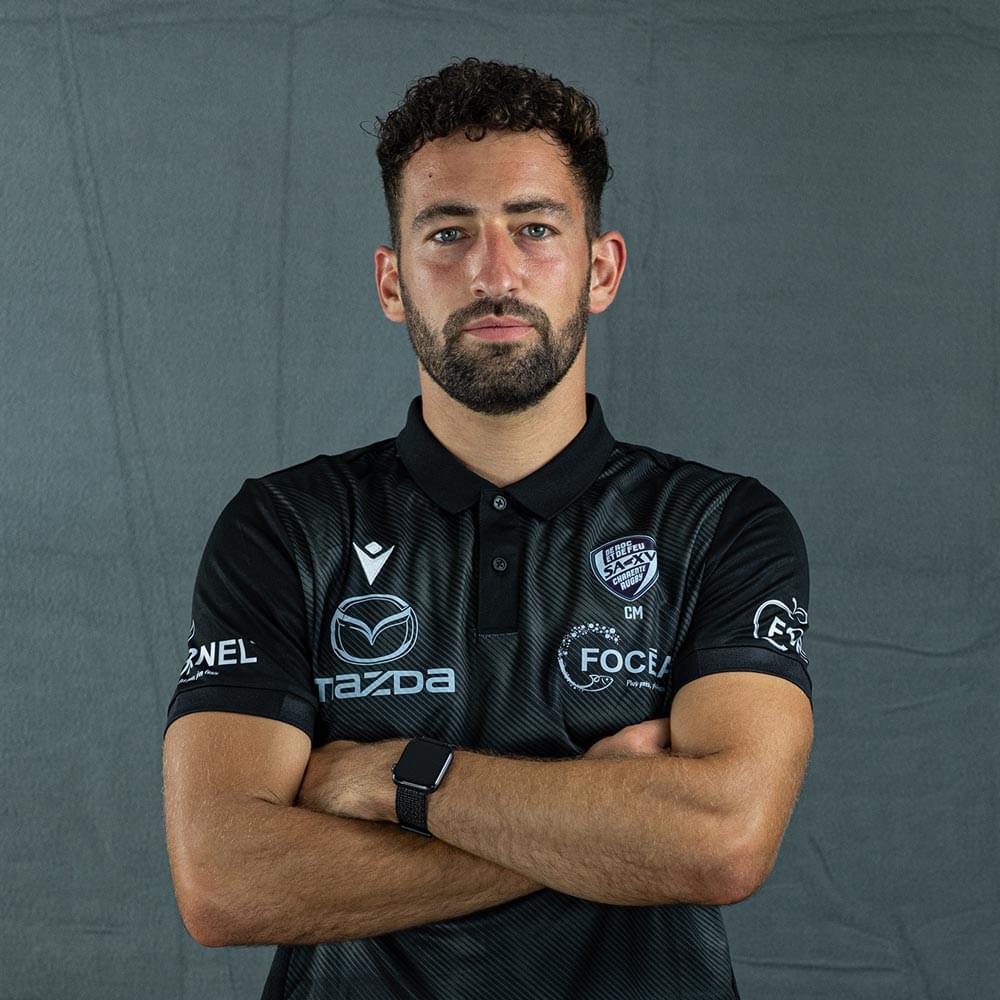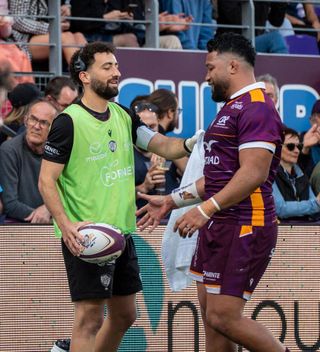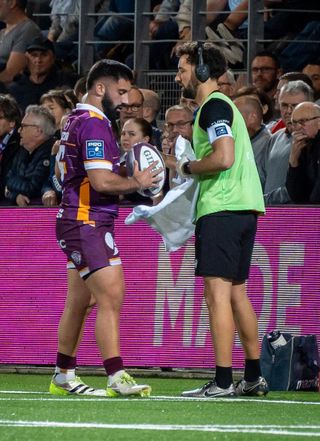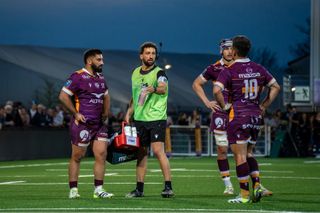
- Clément Meillac (Amiens, 1996) graduated in Physiotherapy at the Faculty of Health Sciences at Manresa in 2022. A fan of sports from an early age, he was certain that he wanted to work in an area related to caring for others, associated with high-level sport. After completing a master’s degree in Sports Sciences in Montpellier, the city where he lived, he decided to supplement his training as a physical trainer with bachelor’s degree studies in Physiotherapy. Manresa was not his first choice, but on the recommendation of a friend and after visiting the University’s facilities and finding out more about it, he ended up deciding to study in the capital of Bages.
- He speaks highly of UManresa’s facilities, methodology and passionate teaching staff, who influenced him and enabled him to develop and achieve outstanding professional milestones, such as forming part of the team of physiotherapists at Montpellier Hérault Rugby, which won the European Challenge Cup and the French TOP 14 during the two years he worked and interned there. Currently, he is physiotherapist for SAXV Charente Rugby and continues to gain experience with the aim of returning to elite sport as a physiotherapist

Where does your vocation for physiotherapy and the world of sport come from?
From a very young age, I was always attracted to helping others. When I was a child, I was always the one to worry about my classmates and take care of them. This, is one of the factors. Another factor is the influence of my father, who was a physical education teacher and almost became a professional footballer. I also played football and this was one of the reasons why, when I finished high school and it was time to choose a degree, I ruled out a career like Medicine. I didn't want to give up football and studying Medicine is very difficult in France and requires a lot of dedication, so I decided to study Sports Science and become a physical trainer.
Were these studies your gateway to physiotherapy?
Yes, it was a good way to access Physiotherapy studies without having to go through a degree in Medicine. If I had done this following the French system, I would have lost a year. At the time, I had finished my studies in Sports Sciences and I was 22 years old. My previous training was a very good complement to physiotherapy, so I decided to continue my training outside of France.
And why did you choose UManresa?
The truth is that my initial idea was to go to Girona, due to its proximity to Montpellier. I wanted to go home at weekends and Girona would have allowed me to do that. But a friend who was studying Physiotherapy in Manresa and who was very bright, told me about the Faculty of Health Sciences at Manresa. So I went to the Montpellier Student Fair to find out about it and I went to the open day that year, which convinced me that Manresa was the best option.
What made you decide?
Several things. For example, the attention and information provided by the two people from UManresa at the Student Fair: Rémi Gontié and Magda Monserdà, who spoke French and gave me a very good explanation of the University. I was also very pleased to find out that during the first year I could opt for free Catalan and Spanish classes and learn through simulation methodology, a methodology that I see as essential in the training of physiotherapists. I can see this now that I have interns to supervise. Practicing with classmates is not the same as simulating situations that are very close to the professional reality.
"The simulation methodology is essential in the training of physiotherapists. I can see this now that I have interns to supervise. Practicing with classmates is not the same as simulating situations that are very close to the professional reality"
How do you remember your time as a student at Manresa?
It was a very enriching period. Apart from training as a physiotherapist, studying at UManresa allowed me to learn two new languages, open up to a new culture and learn more about the situation of Catalonia and its relationship with Spain. I'm convinced that living here and coming here on my own was the right choice. It taught me to wise up and understand what it means to live alone away from family. In fact, it was good training for my life now, as I am also away from home for work. I learned to face problems, I became stronger, especially during the first year, when I was living alone in an apartment.
What would you highlight regarding the academic training?
One of the things I really liked about UManresa was the quality of the infrastructure. It is a place where studying is very comfortable and convenient. In addition, everything was nearby: the library, the cafeteria... You could walk everywhere.
I would also highlight, above all, the teaching staff. There were subjects I didn't like at all, but even so, having teachers who showed their passion for the profession had an impact on me. I especially remember teachers such as Carles Munné, Marc Casas, Sergio Romero, Miquel Dalmau or the director of studies, Gonzalo Lorza. All of them encouraged me and helped me so that I could realize my dream of working in elite sport. I would also say that Rémi Gontié was like an older brother to me and was the person who helped me solve any problems that arose.
Another aspect that is very important to me is the approach to physiotherapy that is taken in the UManresa studies. The training is comprehensive and ranges from diagnosis to treatment. In France, physiotherapists focus on providing the treatment that has been chosen by a doctor. In my day-to-day life, I have realized that the biopsychosocial model of physiotherapy that was instilled in me at Manresa is vital. The person matters. A person is not a number or an injury. In the case of elite athletes, they are not bodies, they are injured people. Seeing them and treating them from this perspective has an impact on the treatment and their recovery, and allows bonds of trust to be formed, because trust is essential to a good recovery. Over time I have realized the importance of psychology classes in the degree; I wasn't aware enough then. I see this difference in approach in my daily life, working with professionals from other countries, who have a way of treating patients that dehumanizes them.
"The biopsychosocial model of physiotherapy that was instilled in me at Manresa is vital. The person matters. A person is not a number or an injury. In the case of elite athletes, they are not bodies, they are injured people”

I am very grateful to UManresa for the training I received there and to all the people who accompanied me in my training, especially Gonzalo Lorza. It is thanks to the University that I can be where I am now and have been able to make a dream come true.
How did you join the world of work?
I was very lucky to be able to do one of my internships at a professional rugby club in Montpellier, Montpellier Hérault Rugby, a team that plays in the French first division. I was there for two months of internship and it went so well that they asked me to stay on, so I extended my stay with the team for another two months. It was at that moment that the team won the Challenge Cup, the European rugby cup. A year later, there was a vacancy in the team of physiotherapists and I was asked to return there. For a year, I combined work and the last stage of my studies. I came to Manresa two days a week and the rest of the days I worked in Montpellier. It was then that the team won the TOP 14, the French national championship. Getting these two titles in a row and being part of the team is one of the most outstanding things I can add to my CV. Unfortunately, after this time they did not renew my contract. It was the first big disappointment of my career.
The club doctor, with whom I had a relationship of trust, told me that to have new opportunities in high-level sport, I had to continue gaining experience. So I took the opportunity that arose to work for a women's team, ASJ Soyaux, a team that competes at the highest level of women's football in France. I learned a lot there, because it was very different from the work I did in Montpellier. In addition, it gave me the professional experience of working in a different environment to what I was used to, because it was a completely female environment and I was used to working surrounded by men.
After a year, I was offered a position in a team that competes in the second level of elite rugby in France (ProD2): SAXV Charente. In fact, the job was offered to me by a doctor I worked with when I was in Montpellier.
I learned a lot at UManresa, but the experience I acquired during the internships and in all these clubs helped me to develop a lot professionally.
What does your job consist of?
Right now, I am the second physiotherapist at SAXV Charente Rugby. My work is in two areas. First, I work on the rehabilitation and maintenance of players who have some type of injury, preparing adapted training sessions for them. Second, on match days I am on the pitch and if there is any kind of injury during the match, I decide if the person can continue playing or need to withdraw.

"I am a physiotherapist at SAXV Charente Rugby, where I work on the rehabilitation and maintenance of players who have some kind of injury and I am on the pitch on match days"
What is your relationship with the athletes like?
We are part of the same team and we share goals: for them to be at 100%. In fact, my experience in all the places I have worked has always been very good. Although you must know how to separate things, because one thing is work and the other is leisure, I have made real friends among the athletes I have dealt with. Now that I work away from home, they are like my family and I spend a lot of free time with them.
Are you satisfied with what you have achieved professionally?
Yes, a lot. I love what I do so much that when I get to work in the morning I don't feel like I'm working. I feel like I'm with friends. In addition, at only 27 years old I have had the opportunity to continue to learn in high-level teams and this is thanks to my double training as a physical trainer and physiotherapist. In my profession, this is highly valued.
“At only 27 years old, I have had the opportunity to continue to learn in high-level teams and this is thanks to my double training as a physical trainer and physiotherapist”

What would be your dream or goal as a physiotherapist?
I would like to be part of a rugby team again that competes in the TOP 14, the elite of French rugby. I would like to be able to travel to competitions in Europe, Africa... And if I could join the French team, even better. It is not an easy goal, because there are only fourteen clubs in all of France and this means that there are only jobs for around fifty physiotherapists.
Have you considered changing sport?
Yes, I've thought about that too. Now I'm young and I can live this lifestyle that requires me to travel a lot at a fast pace. I know that I want to stay connected to high-level sport. When I don't have the strength to continue at this pace, I would like to be part of a team of physiotherapists working in a recovery centre for athletes who are injured. This would allow me to continue to be linked to elite sport, but with a fixed schedule.